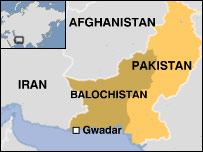Pakistan’s Supreme Court Finds Prime Minister Gilani Guilty of Contempt; Appeal Planned; Opposition Calls for Resignation
In a case that has been simmering for months, Pakistan’s Supreme Court today found Prime Minister Yousuf Raza Gilani guilty of contempt of court for failing to carry through with investigation of corruption charges against President Asif Ali Zardari. Gilani’s “sentence” was brief, lasting only about 30 seconds until the court adjourned. Dawn’s description of what is likely to come next suggests that appeals of various sorts will take months to play out, but the largest opposing political parties are calling for Gilani’s immediate resignation.
From the Express Tribune:
The bench found Gilani guilty of contempt of court for refusing to reopen corruption cases against the president, but gave him only a symbolic sentence of a few minutes’ detention in the courtroom, while he did not receive any jail term.
“For reasons to be recorded later, the prime minister is found guilty of contempt for wilfully flouting the direction of the Supreme Court,” said Justice Nasirul Mulk.
A seven-member bench, headed by Justice Nasirul Mulk announced the verdict and convicted him for violating Contempt of Court Ordinance 2003 section 5 and the charges framed against him were for willfully disobeying the court’s orders and ridiculing it.
The court cited article 63 (1) (g) of the Constitution and observed that the premier might face consequences under it.
The long process ahead for appeals is described in Dawn:
Senator (R) Iqbal Haider said, “The fact remains that the PM has been found guilty of contempt of court and was sentenced under Article 63 (1) (g) of the Constitution of Pakistan. His sentence, no matter how short it was, has serious repercussions. The prime minister has been labelled as a convict.”
“Gilani will certainly file an appeal and will remain in his position till the final appeal is dismissed. At the same time, it is very important to understand that the dismissed appeal can also be filed for further review, providing the government with more time to drag the case,” added Haider.
According to Haider, if the review is also dismissed by the court, the matter will then be taken to the National Assembly of Pakistan. The debate will be initiated to assess the verdict and the speaker of the assembly, on the basis of unanimous decision, can file a reference in the Election Commission of Pakistan.”
“The Election Commission of Pakistan, reviewing all the charges and verdicts against the PM, will issue a notification for de-seating him entirely, however, I must also say that this notification can also be challenged by Gilani,” he added.
Opposition political parties were very quick to call for Gilani’s resignation: Read more →



